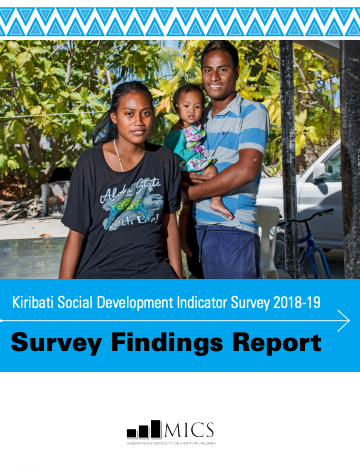The Kiribati Social Development Indicator Survey (KSIDS) was carried out in 2018-19 by Kiribati National Statistics Office in collaboration with Ministry of Health and other government ministries, as part of the Global MICS Programme. Technical support was provided by the United Nations Children’s Fund (UNICEF), United Nations Population Fund (UNFPA) and Pacific Community (SPC) with government funding and financial support of the Australian Department of Foreign Affairs and Trade (DFAT), UNFPA and UNICEF.
The Global MICS Programme was developed by UNICEF in the 1990s as an international multi-purpose household survey programme to support countries in collecting internationally comparable data on a wide range of indicators on the situation of children and women. MICS surveys measure key indicators that allow countries to generate data for use in policies, programmes, and national development plans, and to monitor progress towards the Sustainable Development Goals (SDGs) and other internationally agreed upon commitments.
The Kiribati Social Development Indicators Survey 2018/19 collected data on domestic violence (DV) by including a series of questions that were developed for the domestic violence module of the Demographic and Health Surveys. The objective of the domestic violence module is to measure the prevalence of physical, sexual and emotional violence against women and girls who are, or ever were, married or even who are, or ever have been, living with a man in an intimate relationship. The module also measures the prevalence of physical or sexual violence by perpetrators who are not spouses or cohabiting partners among women, regardless if they have or have not ever been married, since they were 15 years of age. See page 375 for data on domestic violence in Kiribati.


